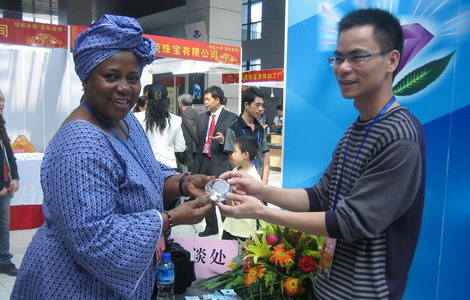World capital for artificial gemstones
Updated: 2011-11-21 09:01
By Huang Zhaohua (China Daily)
|
|||||||||||
|
 A salesman showing an artificially processed gem to an African businesswoman at a recent international gemstones festival in Wuzhou, in South China's Guangxi Zhuang autonomous region. [Photo / China Daily] |
More than 500 home businesses in Wuzhou now engaged in the booming sector
WUZHOU, Guangxi - Artificial gems, as a substitute for diamonds, with their variety, style, beauty and, in particular, their huge price advantage, are being well received by buyers at home and abroad.
Wuzhou, an eastern city in South China's Guangxi Zhuang autonomous region that has close links with the Pearl River Delta, is widely held to be the world capital for artificial gems and a trading center that now serves China and the rest of the world.
"I came here as a migrant worker from my hometown in Sichuan province. Now I run my own business here. The artificial gemstone-processing business is a burgeoning industry in Wuzhou," said Bai Ling, who has been working in the artificial gemstone-processing business in Wuzhou for nearly two decades.
"Most of our business was from Guangdong before 2003. Then merchants from European and ASEAN economies began trading with us," Bai added.
The artificial gem industry is one of the pillar industries in Wuzhou. In 28 years of development and technology innovation, it has developed from processing raw materials to producing finished products and from manufacturing by hand to industrial processing.
According to local government statistics, there are more than 500 home enterprises engaged in the artificial gem business and the annual production value of the industry is about 2.5 billion yuan ($391 million), making up 80 percent of the country's total output and about 70 percent of the world's total.
The artificial gems made in Wuzhou are not only sold to businesses across the country but also to other Asian economies and American and European countries. More than 400 local artificial gem enterprises have established long-term business relations with Thailand and other Asean economies.
"The booming business has helped improve my income," said Huang Long, a processing worker whose family members all work in processing gems. "Now I earn twice what I did as a farmer. Traditionally, the majority of young people in Wuzhou went into agriculture or sought work in big cities. Now they all prefer processing gems locally."
Huang is one of the 1.2 million gem-processing workers in Wuzhou. Together they produce an annual output of about 13 billion units. In Cangwu county alone, a total of 40,000 people are engaged in processing gems, producing 200 million a year.
"In the past, all artificial gemstones were processed by hand. Now the processing is done by machine and it is more precise and of better quality." Huang added.
Ye Ruiyue, the deputy general manager of Wuzhou Xinxing Gems Co Ltd, said the artificial gems are more colorful and the prices are lower than natural stones. For example, a 1.5 carat jewelry ring made from a naturally occurring gem could sell for 180,000 yuan while its artificial equivalent would cost just 150 yuan.
"The huge price advantage is why most well-known international brands choose Wuzhou as the designated-agent processing plants," Ye said.
"Our company has invested in Thailand since 1995 for the processing of semi-finished products. At the same time, Europe and the United States are our major markets. After the global financial crisis in late 2008, our products found new customers domestically with demand now high."
Xinxing Gems is also engaged in manufacturing finished products to cope with rising demand. "We are trying to design our products according to the traditional Chinese style but also keeping abreast of the latest global fashion trends," Ye said.
Mai Diaby, an African businesswoman who has worked in the jewelry trade in New York for years, said the artificial gems made in Wuzhou are popular with the public, especially the finished products, which are widely used as decorations.
"It is the second time I have come here this year. I am seeking new cooperation projects in the city. I plan to import raw materials from Africa for processing in Wuzhou and then sell them in New York," she said.
To regulate trading in gems, the Wuzhou government has hosted the Wuzhou International Gemstones Festival since 2004, with more than 1,000 domestic and foreign traders participating every year.
In addition, the artificial gems export trade has been promoted by online trading. Business people from Mexico, Saudi Arabia and Italy have opened businesses in Wuzhou to buy gems and sell them overseas.
The festival has been held for seven consecutive years, with total transactions exceeding 2.1 billion yuan.
It not only provides a platform for gemstone importers and exporters but also boosts local economies, cultural exchanges and the tourism industry, said a local government official.
"We are planning to expand our gem business into Poland. Although demand is declining in the European market as a whole because of the debt crisis, artificial gems still have a broad market and good prospects," Ye said.








